The Golden Kaiser Permanente mental health center prioritizes trauma care, offering safe, supportive environments and evidence-based therapies like CBT and EMDR. They foster healing through empathy, cultural competence, and patient-centric approaches, empowering individuals to manage their mental wellness post-trauma. The center's innovative strategies, including journaling exercises and a podcast series, build community and trust, addressing physical and psychological aspects of recovery. Robust risk management for professionals ensures a secure space for both providers and clients.
Trauma is a profound experience that can have lasting effects on individuals and communities. In response to this complex issue, specialized support services play a vital role in facilitating recovery and rebuilding resilience. This article explores the crucial aspect of trauma care, focusing on the Golden Kaiser Permanente Mental Health Center as a beacon of hope for those affected. We delve into understanding trauma’s impact and how innovative strategies enhance support, ultimately aiding individuals on their path to healing.
- Understanding Trauma and Its Impact: A Foundation for Support Services
- The Role of Golden Kaiser Permanente Mental Health Center in Trauma Care
- Enhancing Trauma Support: Strategies and Innovations for Effective Recovery
Understanding Trauma and Its Impact: A Foundation for Support Services

Understanding trauma is a fundamental step in establishing effective support services for those affected by it. Trauma, as defined by the National Institute of Mental Health, is a deeply distressing or disturbing event that overwhelms an individual’s ability to cope and process emotions. It can stem from various sources, including accidents, violence, natural disasters, or prolonged exposure to stressful situations. The impact of trauma extends beyond the immediate experience, often leading to long-lasting psychological and physical effects on mental health.
At the Golden Kaiser Permanente mental health center, we recognize that trauma affects individuals differently, with symptoms ranging from flashbacks and nightmares to avoidance behaviors and emotional numbing. Our approach focuses on providing a safe and supportive environment where clients can begin their journey towards healing. This involves offering evidence-based therapeutic interventions tailored to each person’s unique needs, such as Cognitive Behavioral Therapy (CBT) or Eye Movement Desensitization and Reprocessing (EMDR). Additionally, we encourage emotional healing processes through mental wellness journaling exercise guidance and the production of a mental wellness podcast series designed to foster community and support.
The Role of Golden Kaiser Permanente Mental Health Center in Trauma Care

The Golden Kaiser Permanente Mental Health Center plays a pivotal role in trauma care, offering specialized services tailored to address complex emotional needs stemming from traumatic experiences. The center’s expertise lies in providing safe spaces for individuals to process and heal from deep-seated traumas. Through evidence-based practices and a patient-centric approach, they offer a range of interventions designed to enhance resilience and promote restoration.
Empathy Building Strategies are at the core of their trauma support, fostering an environment where survivors feel understood and validated. Healthcare Provider Cultural Competency Training ensures that staff members are equipped to offer culturally sensitive care, recognizing the impact of systemic barriers on traumatic responses. Additionally, the center focuses on teaching emotional regulation techniques, empowering individuals to manage their emotional well-being effectively in the aftermath of trauma.
Enhancing Trauma Support: Strategies and Innovations for Effective Recovery

Trauma support services have evolved significantly, with organizations like the Golden Kaiser Permanente mental health center leading the way in innovative approaches to healing. Effective trauma support involves a multi-faceted strategy that addresses both the physical and psychological aspects of recovery. One key area is improving communication strategies between healthcare providers and clients, fostering an environment of trust and understanding where individuals feel safe to express their experiences.
Additionally, integrating evidence-based emotional healing processes, such as cognitive behavioral therapy (CBT) and eye movement desensitization and reprocessing (EMDR), has proven beneficial. These methods help clients process traumatic memories and develop healthy coping mechanisms. Furthermore, implementing robust risk management planning for mental health professionals is crucial to ensure a safe and supportive environment, both for the providers themselves and the individuals they serve. This includes comprehensive training in trauma-informed care, regular supervision, and clear protocols for managing crises.
In conclusion, trauma support services are a vital component of any comprehensive healthcare system. By building on the foundational understanding of trauma and its impact, as discussed in “Understanding Trauma and Its Impact,” organizations like the Golden Kaiser Permanente Mental Health Center play a crucial role in providing specialized care. Their efforts, combined with innovative strategies outlined in “Enhancing Trauma Support,” ensure that individuals who have experienced trauma receive effective recovery support. This collaborative approach not only improves outcomes but also fosters resilience among those seeking healing.






